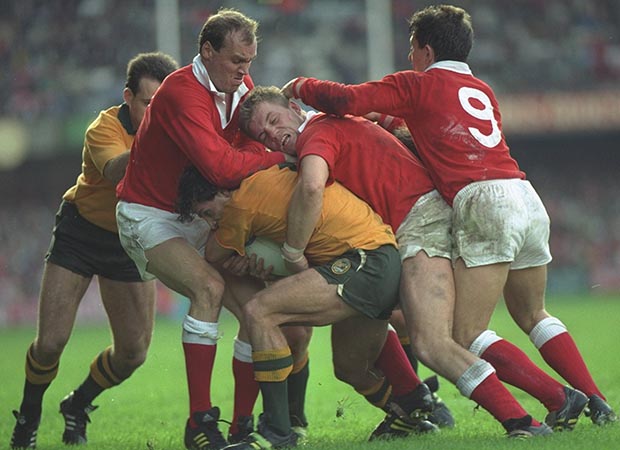Peter Jackson’s column: Ironman’s meteoric rise stands test of time

The official ‘Ironman’ from Swansea will forever be out on his own as the only player to make his debut in a World Cup third-place decider, for Wales against Australia in Rotorua at the inaugural tournament 28 years ago. That is barely half the story.
Webster’s achievement is made all the more incredible by the fact that at 19 he had taken off for Australia the previous month to play club rugby in Canberra, lay bricks at various building sites and demolish more than a few ‘tinnies’. He made the trip in the company of another Welsh teenager, David Young.
When Wales whisked Young from Canberra straight into their front-row for the quarter-final against England in Brisbane, Webster decided to take the weekend off and make the long overnight haul to Queensland to give his pal some moral support.
“The first problem was that I didn’t have any money for the bus fare,” Webster says. “So the boys at the club, Norths in Canberra, had a whip-round and lent me enough cash to get to Brisbane.
“I wore the same clothes for three days because I didn’t have any to change into.
I was on the piss on the Friday and then on the Saturday morning the bus broke down not far from Brisbane and by the time we’d waited for a replacement, the journey had taken 14 hours.
“I had a few more beers on the Saturday. I was just there as a friend of Dai’s, and as a fan, and assumed I’d be going straight back to Canberra.
“I still had no money and I was going to borrow some from the WRU. And then they told me they’d made me a guest member of the squad in case of any more injuries.”
The shock had an immediately sobering effect. It was followed by an even bigger one days later after Wales had been blitzed by Wayne Shelford’s All Blacks in the semi-final.
“After that match I was no longer a guest but part of the squad. So I’d gone from a weekend on the sauce without any money or clothes to being one of the 30.
I thought I was there just to make up the numbers, never mind play any part in the one and only Welsh team to finish third.
“We were all sitting around in a big room at the hotel before setting off for Rotorua and the play-off for third place against Australia. I didn’t expect to be playing any part. At best, maybe, I’d be on the bench but there wasn’t much chance of that because they had so few subs in those days.”
Until then, Webster’s Australian adventure sounded as though it had had a considerably greater impact on beer sales than their construction industry.
“I’d qualified as a bricklayer before I went out and the club in Canberra fixed me up with a bricklaying job,” he says.
“I got sacked after two weeks. Why? Because I was crap.
“Then I got another job working on one of the new buildings around Parliament House in Canberra. I was putting in joints and repairing concrete. Dai was working for a firm that specialised in making doors.”
So many had to open so rapidly for both to make the quantum leap from the building site at Parliament House into the business end of the World Cup. Neither felt the slightest bit out of place.
Webster, born a few days before Young in the summer of 1967, is still the youngest back-row forward to make his debut in a knock-out tie, just as Young is the youngest prop.
Now that professionalism has ensured that rugby doesn’t do fairytales any more, the circumstances behind Webster’s conversion from penniless tourist to the starting No.7 in a matter of days will surely stand alone for the rest of time.”
The chances of a teenager turning up to support his team, admittedly the worse for wear because of his thirst, and going straight into the back-row are remote, to say the least.
Webster, a self-employed builder who says he has barely touched a drop of alcohol for three years, has the perfect analogy. “It’s like some young kid hanging about on the piss at the Vale (Wales’ training base) and getting a game,” he says. “Somehow I doubt if that’ll ever happen.”
At 48, Webster is still pushing back the boundaries and defying the odds. He finished his first Ironman last year and will attempt another in Pembrokeshire next month – swimming for 2.4 kilometres, cycling 112 miles and running a marathon, all 26 miles and 385 yards.
Just as he did last year, Webster will run on crutches. Too many knee operations have left him incapable of running much more than ten metres under his own steam.
Going through all that pain again is typical of the man’s indomitable spirit, a reaffirmation of the self-deprecating view he has of himself as “a bit of a lunatic, a natural pain in the ass”.
This time he is driven not just by the inspiration of his wife, Julie, an Ironwoman in her own right, but a desire to bust enough of a gut for long enough to improve on last year’s highly commendable time of 13 hours, 8 minutes, 55 seconds. He has paid a £400 entry fee for the privilege and, typically, is run not for himself but to raise funds for Welsh rugby‘s Charitable Trust.
“A lot of people do one Ironman and never again,” he says. “I didn’t want to finish with just one. I suppose that’s because I’m dull enough to say I’ll do it again. I can’t really believe what I’ve let myself in for on the 13th of September. Preparing to do the Ironman really takes over your life. I’ve just finished my training, happy that I’ve put all the hours in…”